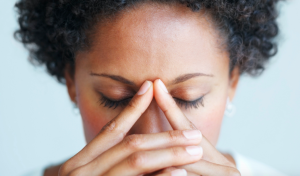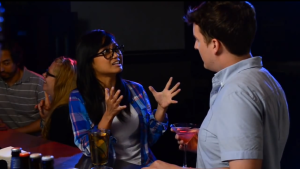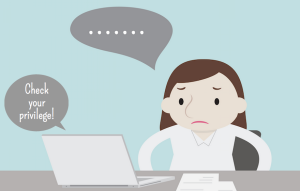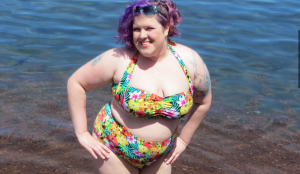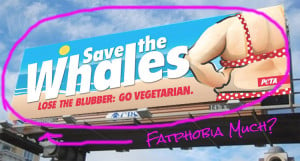Growing up, I often felt a twinge of sadness when my mom would talk about her early life.
An only child, she was born to what were then called older parents – European Jewish Holocaust refugees who had resettled in a New York City community where so many of their friends and neighbors were also either refugees, concentration camp survivors, or, like my mom, the sole children of now very small families.
But it wasn’t only the trauma that her parents had endured that shaped my mother. There was also her father’s death from a heart attack when she was a teenager. And then, shortly after moving to the other side of the continent, her mother’s devastating stroke, which left her confined to a nursing home, paralyzed and unable to communicate, before she too died.
Yet while this history was a backdrop to my youth, my childhood was free of major devastating events.
Sadly, I can’t say the same of my own children, who, at three and six, lost their father when he died suddenly of a rare heart condition. Having seemed perfectly healthy until then, our discovery of him dead on our couch that awful November morning was a devastating shock to us all.
And though I can only guess at how this experience will impact my kids as adults, I do know some of the ways that growing up under a cloud of trauma affected my mom.
One was that she felt immense pressure to be a model child. As a result, she never rebelled, excelled in school, and didn’t date until college.
So when my brothers and I didn’t follow such a path, she found it not only hard to understand, but almost an affront to her values. For example, when she first noticed the tattoo I had been trying to hide, she said icily, “The only people who have tattoos are Holocaust survivors and hoodlums. Which one are you?” before refusing to ever speak of it again.
Generally, though, my mom was a patient and loving parent. But what she wasn’t was someone who did a lot of exploring about how her early life might have affected her later one or impacted how she parented. That’s something that probably could have benefited us all.
It’s also something that other parents who are raising kids while still dealing with the lingering effects of their childhood trauma may want to consider doing since parenting is already a hard enough job as it is.
Thankfully, there are a number of things parents can do if this is a concern.
Here are four.
1. Allow Yourself to Make Mistakes
Elizabeth Corey is a survivor of childhood sexual abuse and sex trafficking. She is also a therapist with expertise on the effects of trauma who writes of the difficulties she now has parenting her own kids.
My childhood of invalidation turned into a lifetime of invalidation. But then I became a parent. I worked hard to validate my children. I told them how smart and beautiful and worthy they were. I gave them hugs and kisses when they were hurt. I told them I loved them every day. Whenever I was conscious of my actions and words, my children were validated. But when I wasn’t conscious, my words were not so supportive. Don’t get me wrong, I was never like my parents. But there were comments, skepticism, sarcasm, and otherwise invalidating statements. Because when I am not conscious, my parenting is a mirror of my internal struggles. And there is nothing I can do to change that, except stay conscious. It still might be a mirror, but at least I am aware of what I need to change.”
Since you’re human and parenting is damn hard work, you will make mistakes. And to various degrees, you may fall back on what you know.
But making mistakes is something every parent in the world has in common, and while you might fear that you trauma will harm your kids, you shouldn’t hold yourself to an impossible standard as a result of it, or be fearful that any misstep will cause lifelong damage in your kids.
When Your Mistakes Cross the Line
Though we need to be gentle with ourselves, we also have to hold ourselves accountable.
Sure, we ‘ll all be short tempered with our kids, punish them unfairly, or say things we later regret. But if we find ourselves crossing the line from normal parenting fails to abusive behavior, we simply can’t justify our actions by saying “Well, I’m damaged, what do you expect?”
If you find yourself in that place, it might be time to get outside help, no matter how scary the consequences might seem.
2. Know Your Triggers
Triggers are those things that set us off, and that can almost instantly bring on anger, or sadness, or anxiety, or shame.
For parents who themselves suffered from childhood trauma, parenting can amplify these feelings.
Partly, that’s because one of the best things about having kids is being allowed to reenter the world of childhood. But for parents who suffered childhood trauma, once again being a part of this this world can result in the reappearance of the emotions associated with what you endured.
That’s why it can be really helpful to figure out what your triggers are and then learn how to avoid or manage or dismantle them. Doing so will help prevent you from lashing out at your kids, withdrawing from them, or hurting yourself when you’re triggered.
When You Just Can’t Avoid Your Triggers
The thing about triggers is that most don’t come with warnings.
I know that after my partner died and I had to muddle through the utterly unfinished business of his estate, I became incredibly anxious when any official paperwork would arrive in the mail.
Indeed, almost three years later, I still find my heart racing and get a feeling of dread when any mail come from the IRS, or the City of New York, or the bank or the courts.
Whether it’s just a parking ticket or a name change form doesn’t matter, since these envelopes can so quickly bring me back to the place where I am in Surrogate Court, trying to make sense of an intensely confusing, emotionally exhausting, and for me, scary experience.
Triggers are complicated and often unavoidable, so addressing them head on is sometimes needed.
3. Let Yourself Heal
There are a lot of reasons it can be hard to heal from childhood trauma.
Some people are burdened with survivor’s guilt. Others are debilitated by anger. Many feel great shame and don’t think they are worthy of feeling good.
But until you’re able to believe that you are entitled to feel whole, doing so will be next to impossible.
So how do you begin to do that? The process is going to be different for everyone, but one of the best ways is to practice self-compassion.
This is something that Beverly Engel, a family therapist and author explains, “encourages us to begin to treat ourselves and talk to ourselves with the same kindness, caring, and compassion we would show a good friend or a beloved child.”
She writes, “Just as connecting with the suffering of others has been shown to comfort and heal, connecting with our own suffering will do the same. If you are able to feel compassion toward others, you can learn to feel it for yourself.”
Engel offers numerous exercises for doing so on her Psychology Today blog, The Compassion Chronicles.
Why Healing Can Be Hard
Everyone is going to be at a different place when it comes to addressing childhood trauma – and today may just not be the right time for you to do so.
But addressing your trauma can make a world of difference.
As Dr. Noam Shpancer writes in an article on dealing with childhood trauma in adult therapy, “Most people are resilient in spite of trauma, particularly if they have positive social relationships, if they learn to problem-solve, and if they develop competencies valued by self and society. In other words, therapy patients are wired for survival, recovery, and adaptation.”
So while it might seem scary, confronting your trauma may be the best way to learn to live with it and not despite it.
4. Getting the Right Diagnosis
Not everyone who has suffered from childhood trauma will seek formal professional help. For some people, self-care will be the right thing. Others will turn to their religion or faith or community.
But many will seek counseling or therapy.
In counseling, you may get a diagnosis of anxiety, or depression, or Post Traumatic Stress Disorder (PTSD). Though common, a PTSD diagnosis can be limiting since it typically refers to the effects of a major incident (say, surviving a war or a car accident). However, there is another model that may be more appropriate in certain situations.
The Complex Post Traumatic Stress Disorder (C-PTSD) is a newer model that allows for the effects of repeated exposure to childhood trauma and views trauma as both interpersonal and emotional.
Many feminist therapists see C-PTSD as a better framework to help treat adult sufferers of childhood trauma, since it avoids victim-blaming by seeing the effects of trauma not as due to individual deficits, but rather, as the result as being a member of a group (like a child) that has been disenfranchised due to its inherent lack of power.
However, while PTSD is a diagnostic classification in the American Psychiatric Association’s Diagnostic and Statistical Manual, Complex PTSD is not. That’s something many people in the field take issue with and it may be included in future editions.
Why Some People Are Nervous About Getting a Diagnosis
If you have been diagnosed with a condition like PTSD or generalized anxiety as a result of your childhood trauma, the idea of getting parenting help can be terrifying.
Worrying that acknowledging parenting difficulties can result in state intervention, or even the loss of your children, isn’t an unfounded fear, particularly for people already involved in the system, those targeted by it, or for those with mental health illnesses.
Indeed, a 2012 report from the National Council on Disability determined that parents with psychiatric conditions experience significant discrimination “when they attempt to exercise their fundamental right to create and maintain families.”
And investigative journalists researching mental illness and parental rights for Propublica found under a law sometimes called “predictive neglect,” about thirty states allow courts to terminate parental rights if authorities decide a parent has a mental illness that will put the child in danger, even if there is no evidence of actual harm or neglect.
Accessing Help
It can be really hard to figure out where and how to get help or even to know exactly what kind of help you want.
Here are a few places to start looking:
- The National Parent Helpline offers a 24-hour crisis hotline for parents.
- Gay Parent Magazine has a good list of parenting resources for LGBT parents.
- The National Association of Mental Illness has this really helpful resource list for families dealing with parental mental illness.
- You might also want to check out books like Finding My Way: A Teen’s Guide to Living with a Parent Who Has Experienced Trauma and Parenting Well When You Are Depressed.
- Plus, the website Parenting Well has a lot of good information for parents dealing with mental illness, including exercises and interactive checklists to help improve parenting strategies.
For people who want to start therapy, one of the biggest barriers can be financial. If this is an issue you can go to the website for the National Association of Free & Charitable Clinics and look at options in your area.
You might also want to see if your job has an Employee Assistance Programs (EAP). These free programs provide therapists to evaluate people for mental health conditions. They also offer short-term counseling.
You can also consider a private therapist.
To find one, ask your friends, relatives, your family doctor, or the guidance counselor at your kids’ school for recommendations. Call to see if they take your insurance or offer a sliding fee scale. You can also find a therapist in your area by checking out the website of your state’s mental health association or on the American Psychological Association (APA)’s psychologist locator.
Plus, if you’re under 26, your mental health care should still be covered under your parent’s insurance policy.
Not every mental health clinic or therapist will be a good fit for you, so it’s really important to have an initial consultation where you talk openly about your needs and their style. Even if it’s subsidized, you deserve to get the help that is right for you.
***
It’s impossible to know how many people are parenting after their own childhood trauma, but it’s fair to say that the numbers are not insignificant.
As someone who grew up with the impact of a historical cultural trauma weighing heavily on my family, I know how long trauma’s effect can last. That’s why it can be so important not to discount the effects your past may be having on your current family experience.
Because while your traumatic experiences may give you more patience and empathy, they might also do just the opposite – and if that’s the case, addressing the root of the issue can be one of the greatest things you do both for yourself and for your children.
For me, that means trying to help my kids heal as children so that they don’t carry unexplored trauma with them into adulthood. For you, it might mean dealing with something very different.
But whatever you are working on, it’s important to know that while childhood trauma can shape you, and will likely color how your approach your own kids, it’s still possible to be a capable, loving parent despite your early experiences.
You just might need a little extra help getting there.
[do_widget id=’text-101′]
Ellen Kate is a Contributing Writer for Everyday Feminism. She’s a health educator, sometimes writer, and mom. She has worked at Manhattan’s Museum of Sex, developed sex education curricula in Mumbai, India, and run HIV prevention programs for at-risk teens in the South Bronx. Currently, Ellen runs a middle and high school health education program and teaches human sexuality at Brooklyn College. More of Ellen’s writing can be found here. Follow her on Twitter @ellenkatef.
Search our 3000+ articles!
Read our articles about:
Our online racial justice training
Used by hundreds of universities, non-profits, and businesses.
Click to learn more


